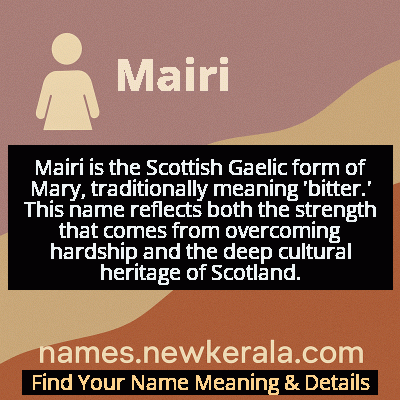Mairi Name Meaning & Details
Origin, Popularity, Numerology Analysis & Name Meaning of Mairi
Discover the origin, meaning, and cultural significance of the name MAIRI. Delve into its historical roots and explore the lasting impact it has had on communities and traditions.
Name
Mairi
Gender
Female
Origin
Scottish
Lucky Number
5
Meaning of the Name - Mairi
Mairi is the Scottish Gaelic form of Mary, traditionally meaning 'bitter.' This name reflects both the strength that comes from overcoming hardship and the deep cultural heritage of Scotland.
Mairi - Complete Numerology Analysis
Your Numerology Number
Based on Pythagorean Numerology System
Ruling Planet
Mercury
Positive Nature
Adventurous, dynamic, curious, and social.
Negative Traits
Restless, impatient, inconsistent, prone to indulgence.
Lucky Colours
Green, white.
Lucky Days
Wednesday.
Lucky Stones
Emerald.
Harmony Numbers
1, 3, 9.
Best Suited Professions
Sales, marketing, travel, entertainment.
What People Like About You
Versatility, charisma, adventurous spirit.
Famous People Named Mairi
Mairi Hedderwick
Author and Illustrator
Created the beloved Katie Morag children's book series set in the Scottish Hebrides
Mairi MacInnes
Poet and Writer
Award-winning Scottish poet known for her collections exploring Scottish identity and landscape
Mairi Chisholm
Nurse and War Hero
Scottish volunteer nurse who established a frontline dressing station in Belgium, awarded the Military Medal
Mairi Ellidh
Traditional Singer
Renowned Scottish Gaelic singer preserving and promoting traditional Scottish music
Name Variations & International Equivalents
Click on blue names to explore their detailed meanings. Gray names with will be available soon.
Cultural & Historical Significance
In modern Scotland, Mairi symbolizes a connection to Gaelic roots while maintaining contemporary relevance, often chosen by families seeking to honor their Scottish heritage and support the revival of Gaelic language and culture. The name appears frequently in Scottish literature, poetry, and folk songs, often representing idealized Scottish womanhood—strong, resilient, yet deeply connected to family and tradition. During the 20th century Gaelic revival movement, names like Mairi became symbols of cultural resistance and identity preservation, making them particularly meaningful for families committed to maintaining Scottish cultural distinctiveness.
Extended Personality Analysis
Women named Mairi are often perceived as possessing a unique blend of traditional values and independent spirit, reflecting the Scottish cultural ideal of strength tempered with warmth. They typically demonstrate resilience and determination, characteristics that align with the historical struggles of Scottish people, yet maintain a deep capacity for loyalty and emotional connection with family and community. Mairis are frequently described as having strong principles and a quiet confidence, often showing remarkable perseverance in facing challenges while maintaining their cultural identity and personal integrity.
This balance of strength and sensitivity makes Mairis natural leaders in their communities and valued friends who provide steadfast support during difficult times. Their personality often combines practical wisdom with creative expression, making them both reliable in practical matters and insightful in emotional situations. Many Mairis display a deep connection to nature and tradition, often finding fulfillment in preserving cultural practices or environmental conservation. They tend to be thoughtful decision-makers who consider both heart and head in their choices, embodying the Scottish virtue of 'canniness'—practical intelligence combined with emotional depth.
Modern Usage & Popularity
In contemporary times, Mairi has experienced a resurgence in popularity, particularly in Scotland and among Scottish diaspora communities worldwide. While not among the most common names, it maintains steady usage as parents seek traditional Scottish names that are distinctive yet familiar. The name has gained attention through the Gaelic language revival movement in Scotland, where choosing Gaelic names represents cultural pride and linguistic preservation. Modern usage shows that Mairi is particularly popular in areas with strong Gaelic connections like the Highlands, Islands, and urban centers with active Gaelic communities. The name's popularity tends to spike around significant Scottish cultural events and has seen increased usage as Scottish nationalism has grown, making it both a personal choice and a political statement for some families seeking to assert Scottish identity.
Symbolic & Spiritual Meanings
Symbolically, Mairi represents the enduring spirit of Scottish culture and the resilience of Gaelic traditions. The name carries connotations of strength forged through adversity, much like Scotland's own history of survival and cultural preservation. It symbolizes the connection between past and present, serving as a living link to Scottish heritage and linguistic traditions. The 'bitter' meaning, rather than being negative, symbolizes the strength that comes from overcoming hardship and the depth of character developed through challenging experiences. Mairi also represents cultural continuity, embodying the transmission of Scottish values, stories, and identity from one generation to the next. In a broader sense, the name symbolizes the preservation of minority languages and cultures in the face of globalization and homogenization, making it a powerful statement about cultural identity and resilience.

